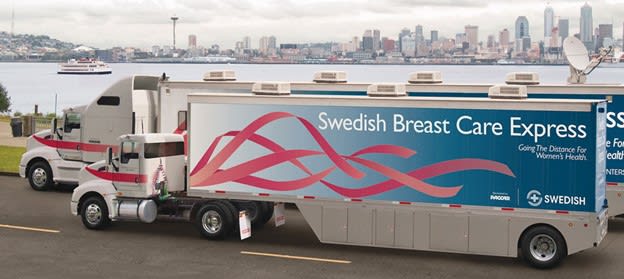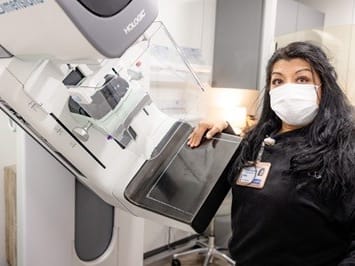
[5 min read]
- Swedish is home to an state-of-the-art mobile mammography program dedicated to ensuring broader access to breast cancer screenings for Washington State residents.
- Our mobile mammography program dates back to 1987, when a technologist hauled a mammography unit around Washington in a horse trailer.
- When they are on the road, the coaches are staffed with interpreters to facilitate communication between patients and caregivers.
- The program is fueled by the generosity of our Swedish Foundation donors.
It’s 12:30 p.m. on a sunny Tuesday in Seattle’s Chinatown–International District, and two women are waiting on the sidewalk. They’re here for their appointments with Swedish’s mobile mammography program, two custom coaches equipped to perform breast cancer screenings on the go. The next appointment isn’t for another half an hour.
Eager patients are a good thing, explains mammography assistant Elaine Hubbard, who’s worked nine years at Swedish. In the United States, a third of women over 40 haven’t had a mammogram in the last two years, yet research at Swedish shows that this regular screening tool increases breast cancer survival rates and catches the disease early, before symptoms appear. Swedish’s mobile mammography program makes this crucial cancer screening more accessible and convenient for communities throughout Western Washington.
Humble origins, philanthropy-fueled growth
Swedish’s mobile mammography program has roots dating back to 1987, when an industrious technologist hauled a mammography unit around in a horse trailer to various Washington locations. Thanks to donors and transformational philanthropic partners like PACCAR, the program has evolved considerably since then.
In 2004, Swedish introduced a 48-foot, self-contained mammography coach. A second, smaller coach better suited for urban locations was added to the fleet in 2008. That coach was replaced in 2022 with a much-needed upgrade.
“The old coach had outdated equipment so it could only take 2D mammograms,” Hubbard explains, standing in the new second coach. “It was so old it had wood paneling on the walls. This coach was possible because of donors and Swedish Foundation.”
“We understand the anxiety of coming in to get a mammogram says. A lot of women are worried about having cancer or think the pain will be really bad, so we try to help them stay calm.” - Mammography Assistant Elaine Hubbard
Today, both Swedish coaches are outfitted with a digital breast tomosynthesis unit, the gold standard in breast cancer screening. This state-of-the-art equipment takes pictures of each breast at four to eight different angles, providing a three-dimensional view of the tissue that leads to more precise screenings and fewer false positives. 
Every day, there are slots for up to 20 appointments:12 in the morning and eight in the afternoon. Between the two coaches, this amounts to nearly 5,000 mammograms each year. The program covers as far north as Everett and as far south as Shoalwater Bay, including over 400 events annually at Swedish primary care locations, community and tribal clinics, corporate clients, and area health fairs.
Providing access where it’s needed most
At 12:50 p.m., the two waiting patients are welcomed into the coach. There’s a language barrier — the interpreter is still on her way — but Hubbard settles them into a small waiting area and checks their IDs and insurance cards. Within a few minutes, they’re ushered into two dressing rooms to change into fabric robes.
One by one, senior mammography technologist Alba Reyes-Searles escorts them back to the exam area, where she runs the tomosynthesis unit. The patients are in and out in less than 10 minutes.
“We hear so many women who tell us they wouldn’t have gotten their screening if our mammography coach wasn’t there,” says Reyes-Searles, who’s been with Swedish since 2007. Her favorite days are the community outreach events, when they’re able to bring this health service to underserved areas.
Eliminating the language barrier
Interpreter Lily Kay arrives at 1 p.m., as the second patient, Jiu Yi Liu, is wrapping up her visit early. It’s just in time to translate some questions Hubbard has about Liu’s insurance card. This is Liu’s third time at Swedish’s mobile mammography coach. At 71, she likes that this location is within walking distance of her home and that interpreters like Kay make everything easy to understand.
“A lot of people are more cautious or hesitant to get a mammogram because of the language barrier,” Kay explains. “I’m happy to help them communicate with the staff.”
This particular day, while parked outside the International Community Health Services clinic on Eighth Avenue, the Swedish team anticipates mostly Cantonese- or Mandarin-speaking patients — Kay speaks both dialects. On days when they’re parked in Holly Park, a different interpreter comes to assist with those whose primary language is Vietnamese.
The next patient arrives at 1:20 p.m. on the dot. Hubbard, Reyes-Searles, and Kay work together in a well-coordinated ballet. While Reyes-Searles assists the patient in the exam room, Kay sanitizes door handles and deposits used robes into a laundry basket. Hubbard enters information into patients’ electronic medical records. The patient is back out the door in 13 minutes.
“We all get along and know what to do,” Kay says.
Serving patients from all walks of life
The 2 p.m. patient is a no-show, but half an hour later, a woman in her thirties enters and asks if the coach takes walk-ins. Hubbard and Reyes-Searles explain, via Kay, that she’ll need a referral from her doctor to get a mammogram before the recommended age of 40.
After doing this work for nearly a decade, Hubbard and Reyes-Searles know how to respond to every situation. When a man enters asking for alcohol wipes, Hubbard politely declines and waits for him to leave. Sometimes patients show up agitated, a sign that they’re stressed about the appointment. In those cases, they do their best to remain professional, explaining every step to make the process as easy as possible.
The lead mammogram technologist who works on the coach even decorated the walls with artwork to give it a cozier, more welcoming look.
“We understand the anxiety of coming in to get a mammogram,” Hubbard says. “A lot of women are worried about having cancer or think the pain will be really bad, so we try to help them stay calm.”
Off to the next stop
The afternoon ends in a flurry of appointments. Sok Mei Chou, 67, comes in at 2:40 p.m. She’s done her breast cancer screenings with Swedish’s mobile mammography coach for years, on her doctor’s recommendation, and appreciates the convenience.
An International Community Health Services clinician hustles in at 2:50 p.m., squeezing her mammogram in between her own patient appointments. At 2:55 p.m. another patient enters and is immediately shown into a dressing room to change.
When the last patient departs, Hubbard and Reyes-Searles start wiping down equipment and putting away supplies. A driver is already waiting in a tractor unit down the block, ready to take the coach back for the evening.
In a few days, they’ll be in Renton. The following week, down to Tokeland, Shelton, and Olympia for appointments with the Shoalwater Bay Indian Tribe and Squaxin Island Tribe.
“I love being out here,” Reyes-Searles says with a smile. “I love knowing that I’m helping people who don’t have insurance and who wouldn’t have gotten a mammogram at a clinic. It’s what motivated me to do this work.”
Learn more and find a physician or advanced practice clinician (APC)
Want to schedule your mobile mammogram appointment or bring the mobile mammography coach to your workplace for a screening event? Visit our website to find out more.
At the Providence Swedish Cancer Institute, we know that no two cancers are alike. That’s why we focus on you — not your disease. If you need cancer care or are looking for testing to determine your cancer risk, we can help.
You can also learn more about available clinical trials. Our physician investigators and researchers are involved in hundreds of ongoing trials involving most types of cancer.
Whether you require an in-person visit or want to consult a doctor virtually, you have options. Contact Swedish Primary Care to schedule an appointment with a primary care physician. You can also connect virtually with your doctor to review your symptoms, provide instruction and follow up as needed. And with Swedish ExpressCare Virtual, you can receive treatment in minutes for common conditions such as colds, flu, urinary tract infections, and more. You can use our provider directory to find a specialist or primary care physician near you.
Information for patients and visitors
About the Swedish Foundation
Your generous gift helps support a healthy tomorrow for everyone in every community we serve. Learn about more ways to give to the Swedish Foundation or make a direct donation online at swedishfoundation.org. You can also contact the Foundation at 206-368-2738 or email foundation@swedish.org. Thank you for helping us shape the future of healthcare. We can’t do it without you.
Related resources
Five years after a multiple myeloma diagnosis, this Swedish patient is living her best life
The future of cancer care is in your genes
Did you know that colon cancer is on the rise among younger adults? Screening is key to prevention.
Swedish caregivers helped this musician get back in tune after cancer treatment
This information is not intended as a substitute for professional medical care. Always follow your health care professional's instructions.
About the Author
More Content by Swedish Cancer Team





















